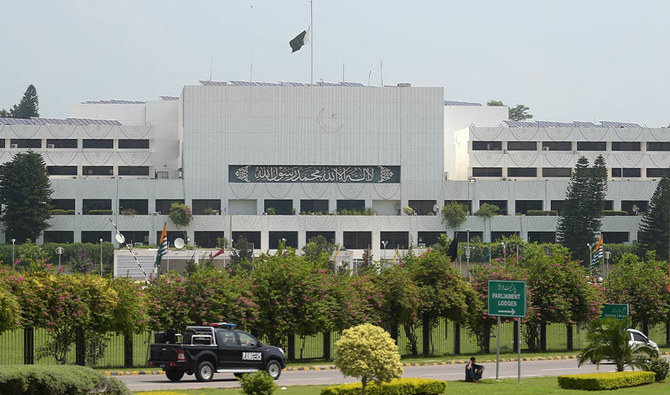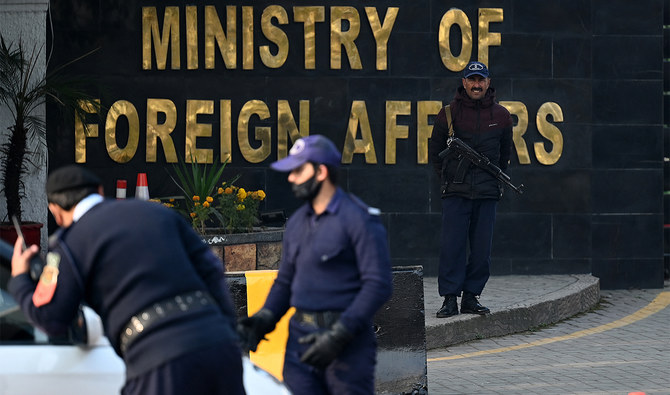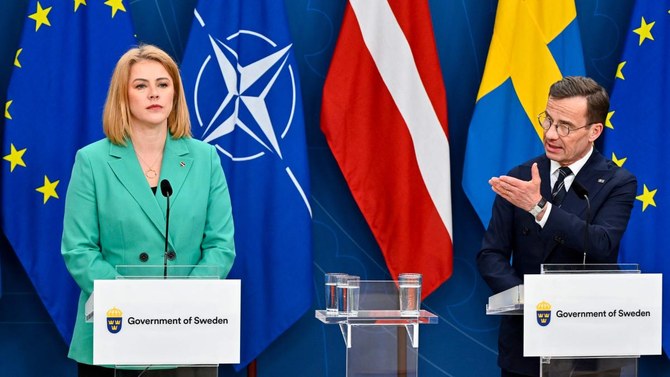ISLAMABAD: The Senate and National Assembly sessions have been postponed till Monday, according to the information posted on the Twitter accounts of the two houses of parliament late Friday night.
The sessions were originally scheduled to be held on Saturday.
The National Assembly of Pakistan had to take up three bills related to the appointment and tenure of services chiefs in the country for discussion and approval in today’s sitting.
Pakistan’s parliamentary panel on defense on Friday approved the bills after the government succeeded in garnering support of at least two major opposition parties.
The joint standing committee of parliament on defense passed three bills to amend the Army Act, the Navy Act, and the Air Force Act, specifying procedures for the appointment and reappointment of services chiefs.
“These bills will now be presented in the National Assembly tomorrow [Saturday] for approval,” Senator Azam Khan Swati, Federal Minister for Parliamentary Affairs, told the media after the defense committee’s meeting.
Earlier, Federal Minister for Defense Pervez Khattak tabled the Pakistan Army (Amendment) Act 2020 in the National Assembly, paving the way for a three-year extension in the army chief General Qamar Javed Bajwa’s service tenure.
He also separately presented the Pakistan Navy (Amendment) Act and the Pakistan Air Force (Amendment) Act in the lower house, which the speaker, as per parliamentary procedure, referred to the defense committee for further deliberations.
The federal cabinet on Wednesday approved amendments in the Army, Navy and Air Force Acts in a hurriedly convened meeting to plug legal lacunae in the appointment and reappointment of services chiefs as pointed out by the Supreme Court in its verdict in November last year.
Prime Minister Imran Khan extended General Bajwa’s tenure through a notification in August 2019, but the Supreme Court suspended it on Nov 26, 2019, citing irregularities and loopholes in relevant laws.
The court later announced that General Bajwa would continue to serve as the army chief for another six months during which the national parliament would legislate on his extension/reappointment.
“The retirement age and service limits prescribed for a General, under the rules and regulations made under this act, shall not be applicable to the Chief of the Army Staff, during his tenure of appointment, reappointment, or extension, subject to a maximum age of sixty-four (64) years,” Pakistan Army (Amendment) Act, 2020, reads.
The amendment bill also empowers the president to reappoint the army chief for an additional tenure of three years or extend his tenure for another three years on the advice of the prime minister “in the national security interest or exigencies, from time to time.”
Talking to reporters outside the Parliament House, Prime Minister Imran Khan’s Special Assistant on Media Firdous Ashiq Awan said the government and opposition parties were “plugging the lacunae in the law by doing legislation.”
“All political parties have shown wisdom on the issue,” she said.
Senator Mushahidullah Khan of the Pakistan Muslim League-Nawaz (PML-N) said his party was extending “unconditional support” to the amendment acts since “it doesn’t want to make national institutions controversial.”
“We have taken this decision in the national interest despite strong criticism from our supporters,” he told Arab News.
Pakistan Peoples Party’s Chairperson Bilawal Bhutto Zardari said that his party was left with little choice after the major opposition party in parliament, PML-N, decided to extend unconditional support to the bills without taking other opposition parties on board.
“We are happy the government is following parliamentary rules and procedures [for the passage of the three bills] on our party’s advice instead of bulldozing them through the House,” he added.






















